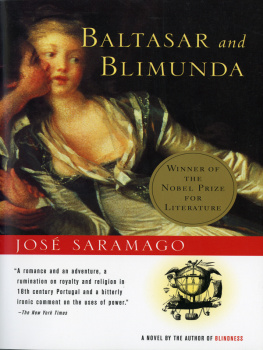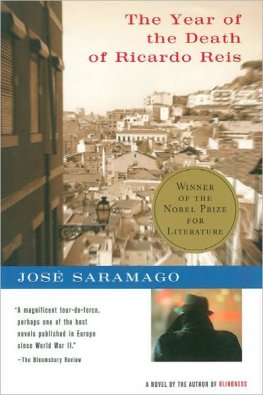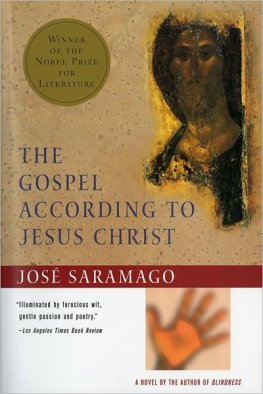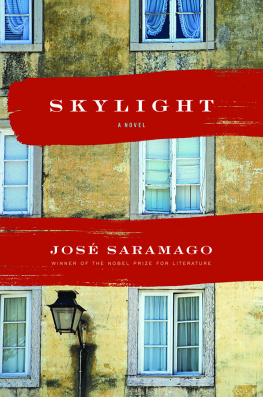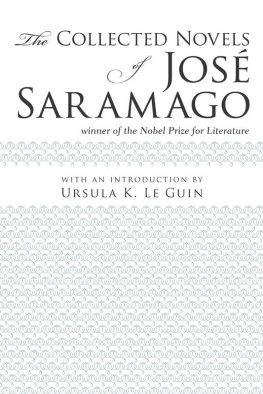Jose Saramago - Baltasar and Blimunda
Here you can read online Jose Saramago - Baltasar and Blimunda full text of the book (entire story) in english for free. Download pdf and epub, get meaning, cover and reviews about this ebook. year: 1998, publisher: Mariner Books, genre: Detective and thriller. Description of the work, (preface) as well as reviews are available. Best literature library LitArk.com created for fans of good reading and offers a wide selection of genres:
Romance novel
Science fiction
Adventure
Detective
Science
History
Home and family
Prose
Art
Politics
Computer
Non-fiction
Religion
Business
Children
Humor
Choose a favorite category and find really read worthwhile books. Enjoy immersion in the world of imagination, feel the emotions of the characters or learn something new for yourself, make an fascinating discovery.
- Book:Baltasar and Blimunda
- Author:
- Publisher:Mariner Books
- Genre:
- Year:1998
- Rating:5 / 5
- Favourites:Add to favourites
- Your mark:
- 100
- 1
- 2
- 3
- 4
- 5
Baltasar and Blimunda: summary, description and annotation
We offer to read an annotation, description, summary or preface (depends on what the author of the book "Baltasar and Blimunda" wrote himself). If you haven't found the necessary information about the book — write in the comments, we will try to find it.
Baltasar and Blimunda — read online for free the complete book (whole text) full work
Below is the text of the book, divided by pages. System saving the place of the last page read, allows you to conveniently read the book "Baltasar and Blimunda" online for free, without having to search again every time where you left off. Put a bookmark, and you can go to the page where you finished reading at any time.
Font size:
Interval:
Bookmark:
Translated from the Portugese
by Giovanni Pontiero
A HARVEST BOOK HARCOURT, INC.
Orlando Austin New York San Diego Toronto London
Editorial Caminho, SARL, Lisboa, 1982
English translation copyright 1987 by Harcourt, Inc.
All rights reserved. No part of this publication may be reproduced
or transmitted in any form or by any means, electronic or mechanical,
including photocopy, recording, or any information storage and retrieval
system, without permission in writing from the publisher.
Requests for permission to make copies of any part of the work should be
mailed to the following address: Permissions Department, Harcourt, Inc.,
6277 Sea Harbor Drive, Orlando, Florida 32887-6777.
This is a translation of Memorial do Convento.
Library of Congress Cataloging-in-Publication Data
Saramago, Jos
Baltasar and Blimunda.
Translation of: Memorial do convento.
I. Title.
PQ9281.A66M4613 1987 869.3'42 87-8697
ISBN 0-15-110555-3
ISBN 0-15-600520-4 (pbk.)
Text set in Monotype Bembo
Printed in the United States of America
First Harvest edition 1998
O Q S R P N
In memoriam Giovanni Pontiero
A man was on his way to the gallows when he met another, who asked him: Where are you going, my friend? And the condemned man replied: I'm not going anywhere. They're taking me by force.
Padre Manuel Velho
Joo
Je sais que je tombe dans l'inexplicable, quand j'affirme que la ralitcette notion si flottantela connaissance la plus exacte possible des tres est notre point de contact, et notre voie d'accs aux choses qui dpassent la ralit.
Marguerite Yourcenar
D OM JOO, THE FIFTH monarch so named on the royal list, will pay a visit this night to the bedchamber of the Queen, Dona Maria Ana Josefa, who arrived more than two years ago from Austria to provide heirs for the Portuguese crown, and so far has shown no signs of becoming pregnant. Already there are rumours at court, both within and without the royal palace, that the Queen is barren, an insinuation that is carefully guarded from hostile ears and tongues and confided only to intimates. That anyone should blame the King is unthinkable, first because infertility is an evil that befalls not men but women, who for that very reason are often disowned and second, because there is material evidence, should such a thing be necessary, in the horde of bastards produced by the royal semen, who populate the kingdom and even at this moment are forming a procession in the square. Moreover, it is not the King but the Queen who spends all her time in prayer, beseeching a child from heaven, for two good reasons. The first reason is that a king, especially a king of Portugal, does not ask for something that he alone can provide, and the second reason is that a woman is essentially a vessel made to be filled, a natural supplicant, whether she pleads in novenas or in occasional prayers. But neither the perseverance of the King who, unless there is some canonical or physiological impediment, vigorously performs his royal duty twice weekly, nor the patience and humility of the Queen, who, besides praying, subjects herself to total immobility after her husband's withdrawal, so that their generative secretions may fertilise undisturbed, hers scant from a lack of incentive and time, and because of her deep moral scruples, the King's prodigious, as one might expect from a man who is not yet twenty-two years of age, neither the one factor nor the other has succeeded so far in causing Dona Maria Ana's womb to become swollen. Yet God is almighty.
Almost as mighty as God is the replica of the Basilica of St Peter in Rome that the King is building. It is a construction without a base or foundation, resting on a table-top, which does not need to be very solid to take the weight of a model in miniature of the original basilica, the pieces lying scattered, waiting to be inserted by the old method of tongue and groove, and they are handled with the utmost reverence by the four footmen on duty. The chest in which they are stored gives off an odour of incense, and the red velvet cloths in which they are separately wrapped, so that the faces of the statues do not scratch against the capitals of the columns, reflect the light cast by the huge candelabras. The building is almost ready. All the walls have been hinged together, and the columns have been firmly slotted into place under the cornice with the name and title of Paolo V Borghese inscribed in Latin which the King no longer reads, although it always gives him enormous pleasure to observe that the ordinal number after the Pope's name corresponds to the V that comes after his own. In a king, modesty would be a sign of weakness. He starts to place the effigies of prophets and saints into the appropriate grooves on top of the walls and the footman gives a low bow as he removes each statue from its precious velvet wrappings. One by one, he hands the King a statue of some prophet lying face down, or of some saint turned the wrong way around, but no one heeds this unintentional irreverence as the King proceeds to restore the order and solemnity that befits sacred objects and turning them upright, he inserts each vigilant statue into its rightful position. What the statues see from their lofty setting is not St Peter's Square but the King of Portugal and his retinue of footmen. They see the floor of the dais and the screens looking on to the Royal Chapel, and tomorrow at early Mass, unless they have already been wrapped up and put back in the chest, the statues will see the King devoutly attend the Holy Sacrifice of the Mass with his entourage, different nobles from those who are with him at present, for the week is ending and others are due to take their place. Beneath the dais where we are standing, there is a second dais, also hidden by screens, but there are no pieces here waiting to be assembled, it is an oratory or a chapel where the Queen attends Mass privately, yet not even this holy place has been conducive to pregnancy. Now all that remains to be set in position is the dome by Michelangelo, a copy of that remarkable achievement in stone which, becauses of its massive proportions, is kept in a separate chest and, as the final, and crowning piece, is treated with special care. The footmen make haste to assist the King and, with a resounding clatter, the tenons and mortises are fitted together and the job is finished. If the overwhelming noise that echoes throughout the chapel should penetrate the long corridors and spacious apartments of the palace into the chamber where the Queen is waiting, she will know that her husband is on his way.
Let her wait. The King is still preparing himself before retiring for the night. His footmen have helped him to undress and have garbed him in the appropriate ceremonial robes, each garment passing from hand to hand with as much reverence as if they were the relics of holy virgins, and this ceremony is enacted in the presence of other servants and pages, one opens the huge chest, another draws back the curtains, one raises the candle, while another trims the wick, two footmen stand to attention, and two more follow suit, while several others hover in the background with no apparent duties to fulfil. At long last, thanks to their combined labours, the King is ready, one of the nobles in attendance straightens a last fold, another adjusts the embroidered nightshirt, and any moment now, Dom Joo V will be heading for the Queen's bedchamber. The vessel is waiting to be filled.
Now Dom Nuno da Cunha, the bishop who heads the Inquisition makes his entrance accompanied by an elderly Franciscan friar. Before he approaches the King to deliver his news, there is an elaborate ritual to be observed with reverences and salutations, pauses and retreats, the established protocol when approaching the monarch, and these formalities we shall treat as having been duly observed, given the urgency of the bishop's visit and the nervous tremors of the elderly friar. Dom Joo V and the Inquisitor withdraw to one side, and the latter explains, The friar who stands before you is Friar Antony of St Joseph, to whom I have confided Your Majesty's distress at the Queen's inability to bear you children. I begged of him that he should intercede on Your Majesty's behalf, so that God may grant you succession, and he replied that Your Majesty will have children if he so wishes, and then I asked him what he meant by these obscure words, since it is well known that Your Majesty wishes to have children, and he replied in plain words that if Your Majesty promises to build a convent in the town of Mafra, God will grant you an heir, and after delivering this message, Dom Nuno fell silent and bade the friar approach.
Font size:
Interval:
Bookmark:
Similar books «Baltasar and Blimunda»
Look at similar books to Baltasar and Blimunda. We have selected literature similar in name and meaning in the hope of providing readers with more options to find new, interesting, not yet read works.
Discussion, reviews of the book Baltasar and Blimunda and just readers' own opinions. Leave your comments, write what you think about the work, its meaning or the main characters. Specify what exactly you liked and what you didn't like, and why you think so.

